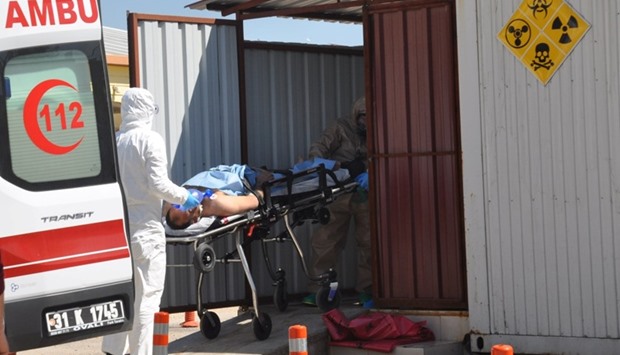A suspected Syrian government chemical attack in Idlib killed scores of people, including children, on Tuesday, a monitoring group, medics and rescue workers in the rebel-held area said, but casualty numbers have varied since.
While the Syrian military denied responsibility, several Western countries, including the United States, have blamed the armed forces of Syrian President Bashar al-Assad for the chemical attack that choked people to death in the town of Khan Seikhoun in a rebel-held area of northern Syria on Tuesday.
Erdogan, one Assad's most steadfast critics who has repeatedly called for his ouster, also called the Syrian president a "murderer".
"More than 100 people were killed by chemical weapons in Idlib. Hey, murderer Assad...how will you account for this?," Erdogan said at a rally in the northwestern province of Bursa.
Earlier on Wednesday, Turkey said it had reminded Russia and Iran of their responsibilities in preventing violations of an ongoing ceasefire in Syria by making representations at the Russian and Iranian embassies in Ankara.
Russia, which backs Assad, denied the Syrian president was to blame for the attack, and said it would continue to support him.
The United States, Britain and France on Tuesday proposed a UN Security Council resolution condemning the attack, but Erdogan demanded that the international community, namely the United Nations, be more critical on the matter.
Turkish Health Minister Recep Akdag said that around 30 people had been brought across the border to Turkish hospitals for treatment as of Tuesday. In a later statement, the health ministry said three of those in hospitals had died while 29 were still in treatment.
If confirmed, the incident would be the deadliest chemical attack in Syria since sarin gas killed hundreds of civilians in Ghouta near Damascus in August 2013.
Following the 2013 attack, Syria joined the international Chemical Weapons Convention under a US-Russian deal, averting the threat of US-led military intervention and agreeing to give up its toxic arsenal for destruction.
The UN and the Organisation for the Prohibition of Chemical Weapons (OPCW) found, however, that it continued to use chlorine, which is widely available and hard to trace, in so-called barrel bombs dropped from helicopters.

A Syrian man from Idlib is carried by Turkish medics wearing chemical protective suits to a hospital in the border town of Reyhanli in Hatay province, Turkey.
The suspected chemical attack in Syria's northwestern Idlib province killed more than 100 people, Turkish President Tayyip Erdogan said on Wednesday, without saying where the death toll number came from.
